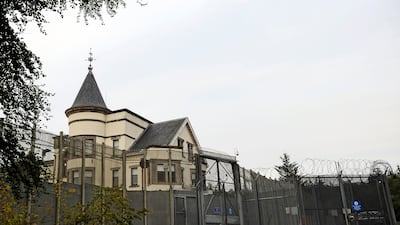An Egyptian engineer with a rare medical condition is battling a life-threatening deportation back to his home country where there is no treatment available, his lawyer has said.
Youssef Mikhaeil is currently being held in an immigration removal centre in Scotland and the Home Office has told him a ticket has been booked for him to fly to Cairo on June 5.
Mr Mikhaeil suffers from Fabry disease, a rare inherited neurological disorder, and his lawyer Usman Aslam told The National there is a serious risk of death if he is sent back to Egypt.
He has degree in aeronautical engineering from Glasgow University and lives in the city with his British partner.
Mr Mikhaeil is attempting to remain in the UK on humanitarian grounds after being diagnosed in 2020 and was about to present medical evidence when he was detained, Mr Aslam said.
A letter from an Egyptian hospital which said the absence of treatment would “cause intense suffering or death” if he returned home arrived with on May 15 and he was due to meet his client on May 17.
But in the intervening day, Mr Mikhaeil was detained while attending a regular meeting at the Home Office and sent to the Dungavel Immigration Removal Centre in South Lanarkshire.
The way the Home Office has conducted the case is “toxic” and has gone from “hostile to nasty”, Mr Aslam told The National.
“Usually they take a year to make a decision but on this one I have a funny feeling they will make it in hours and say they’ve refused it and are still going to remove him,” he said.
“The number one priority is now to stop the flight and thereafter I’m going to apply for bail to get him released.
“He’s never missed a meeting so is not a flight risk so is the wrong person to detain.”

Fabry disease is a rare, inherited neurological disorder which affects the heart, kidneys, brain, central nervous system and skin. About one in 40,000 men suffer from it.
In its letter to Mr Aslam, the Misr Hospital in Cairo says that “Mr Mikhaeil cannot live in Egypt due to the hot climate”. His condition means he cannot produce sweat.
If untreated the consequences of his condition can include “heat stroke and death” but currently there is a “lack of treatment for his rare genetic disorder” including drugs, the letter said.
“Undoubtedly, the absence of the required treatment for this rare disorder in Egypt would cause intense suffering or death,” said the hospital in their letter.
Mr Usman said it was a “massive concern” that his client is unable to get medical treatment in Egypt.
He said Mr Mikhaeil’s partner, Sarah Bradley, has been “left distraught” by the situation.
“They’ve agreed to get married and often the Home Office in these circumstances say ‘well show us a reason why you can’t go and live in Egypt’,” Mr Usman said.
“Well he can’t and there’s evidence to say he couldn’t live there.
“If they stop the flight they won’t make a decision for a year so there’s no need to keep him in detention at a cost to the public.”
Mr Mikhaeil is a graduate who speaks fluent English speaker and whose partner can support him, Mr Usman said. This meets the criteria for being allowed to stay: someone who can integrate and is not a burden on the state, he added.
Ms Bradley described her partner’s condition as “quite severe”.
“On the best of days, Youssef walks around with occasional cramps, but other days he can be in severe pain,” she told The Scotsman.
He “is the kind of person who does everything by the book” and “until now, we’ve never had a problem” regarding his application, she said.
“But on this occasion, the Home Office, instead of going through the official procedure and calling his solicitor to find out what is happening, made the decision there and then to start the procedure of detainment,” she said.
A Home Office representative said: “All applications for leave to remain are carefully considered on their individual merits, on the basis of the evidence provided and in accordance with the immigration rules.
“In some cases immigration detention is required while we organise an individual’s removal from the UK. We only return those with no legal right to remain in the UK and will not return anyone to countries where they have been found to be at risk of persecution or serious harm."


